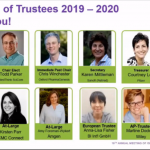Since the launch of Plan S last September, not a day goes by without a mention on social media of open access or cOAlition S. Many research funders have rallied in support of open access because it gives the work they fund its maximum impact and widest possible audience. Scientific publishers are also beginning to accommodate the growing demand for open access research. Given the wide range of public-access models used by journals, it comes as little surprise that the blanket term ‘open access’ means different things to different people. Last week’s ISMPP-U webinar ‘Open Access and Medical Publishing’, developed by the Medical Publishing Insights & Practices (MPIP) initiative and Open Pharma and moderated by LaVerne Mooney (Pfizer) and Chris Winchester (Oxford PharmaGenesis), aimed to define the key elements of open access policies, to provide insight into the changing publishing environment and to understand the perspectives of non-commercial and commercial stakeholders on open access publishing.
Open access is referred to most simply as peer-reviewed, full research articles that have been accepted for publication and that are available on demand online without a charge to end users. Many people, including members of cOAlition S, would even consider free-to-read articles not fully open. In reality, open access is used to describe numerous different publishing models, all with different options and restrictions in place. Although Creative Commons Licences (CCLs) are in place to define article sharing and reuse rights, these are often poorly understood. In addition to breaking down the jargon of CCLs, the webinar also highlighted how non-profit sites such as Unpaywall provide a legal route to copies of scientific manuscripts.
In the second half of the webinar, the moderators opened the floor to the various stakeholders in scientific publishing to hear their perspectives on open access in a virtual Q&A session. Initial questions for the panel focused on the meaning of open access to each stakeholder. Representing Shire (now part of Takeda), the first pharmaceutical company to require its sponsored research manuscripts to be published open access, Valerie Philippon shared her experiences of Shire’s open access policy and the challenges the company has faced. Ashley Farley from the Bill & Melinda Gates Foundation (who have already endorsed Plan S) shared how the foundation uses Altmetric to track the impact of their grantees’ publications.
When the panel members were asked for their own opinions on open access, patient advocate Alan Thomas, founder of Ataxia and Me, was quick to voice his support, explaining the frustration many patients feel when faced with a paywall. Although in support of open access overall, Professor Britt Holbrook from the New Jersey Institute of Technology shared his concerns for academic freedom if researchers are forced to comply with open access mandates from outside the academic community.
Both Britt Holbrook and David Sampson from the American Society of Clinical Oncology spoke about their worries surrounding the potential misuse and misinterpretation of open access research published with a Creative Commons Attribution (CC BY) licence. For example, David Sampson mentioned the risk that predatory publishers (journals that charge authors publication fees but do not provide value-adding editorial or publishing checks) offering the CC BY licence could become more prominent, which could not only threaten public health and safety but lead to fewer publication citations. Wiley’s Joe Adams issued words of caution surrounding CC BY licensing and the effect that open access with unlimited reuse rights could have on current journal models. Joe Adams also shared his experiences of how the common misconceptions surrounding open access publishing can lead to larger problems down the line, calling for authors to question access options before publication of their manuscript.
The webinar concluded with the question “Should pharmaceutical companies require the research they fund to be published open access?” Stakeholders agreed on the possibility of universal open access in the future, with Alan Thomas of the opinion that mandatory open access for pharma companies can only be a good thing. Both Joe Adams and Ashley Farley urged stakeholders to continue these discussions to ensure the best outcome for everyone in the evolving publishing ecosystem.
The slides and a recording of the webinar are available here.
Image courtesy of Allen Allen






